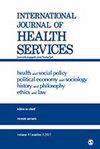New Bottle, Old Wine? Implications of the World Bank's Systematic Diagnostic Reports for the Rise of Noncommunicable Diseases in the Organization of Eastern Caribbean States
IF 3.4
4区 医学
Q1 HEALTH CARE SCIENCES & SERVICES
引用次数: 0
Abstract
Since its foundation in 1944, the International Bank for Reconstruction and Development, soon renamed the World Bank (hereafter, “the Bank”), has shifted its initial goal of reconstructing post-World War II Europe to promoting economic development and alleviating poverty in Africa, Asia, Latin America, and the Caribbean. Bank assistance is provided through loans awarded to countries that agree to policy changes that the Bank deems necessary to achieve its stated goals. Bank policies—dubbed Structural Adjustment Programs (SAPs) and, over time, superseded by Poverty Reduction Strategy Papers—have been criticized for not only failing to ameliorate underdevelopment and poverty, but for exacerbating both. The most recent Bank approach to development and poverty alleviation, the Systematic Diagnostic Reports (SDR), attempts to address these criticisms. We appraise the SDR for six Organization of Eastern Caribbean States (OECS). All share daunting economic and social challenges, including an ongoing epidemic of noncommunicable diseases (NCDs). We argue that, contrary to the Bank's claims, these challenges will continue under, and may even be exacerbated by, the policies the Report demands, and we elaborate on their implications for NCDs in the OECS and for social and health equity in the region.新瓶装旧酒?世界银行系统诊断报告对东加勒比国家组织非传染性疾病上升的影响
自1944年成立以来,国际复兴开发银行(后更名为世界银行)已将其重建二战后欧洲的最初目标转变为促进非洲、亚洲、拉丁美洲和加勒比地区的经济发展和减轻贫困。世行的援助是通过向同意世行认为实现其既定目标所必需的政策改革的国家提供贷款的方式提供的。世行的政策被称为结构调整计划(SAPs),并随着时间的推移被减贫战略文件所取代,这些政策不仅未能改善不发达和贫困状况,而且加剧了这两种状况。世行最新的发展和扶贫方法,即系统诊断报告(SDR),试图解决这些批评。我们评价东加勒比国家组织六个成员国的特别提款权。所有国家都面临严峻的经济和社会挑战,包括非传染性疾病的持续流行。我们认为,与世行的说法相反,这些挑战将在报告要求的政策下继续存在,甚至可能因政策而加剧。我们详细阐述了这些挑战对东加勒比国家组织的非传染性疾病以及该地区的社会和卫生公平的影响。
本文章由计算机程序翻译,如有差异,请以英文原文为准。
求助全文
约1分钟内获得全文
求助全文
来源期刊
CiteScore
4.50
自引率
2.90%
发文量
41
审稿时长
>12 weeks
期刊介绍:
The International Journal of Health Services is a peer-reviewed journal that contains articles on health and social policy, political economy and sociology, history and philosophy, ethics and law in the areas of health and well-being. This journal is a member of the Committee on Publication Ethics (COPE).

 求助内容:
求助内容: 应助结果提醒方式:
应助结果提醒方式:


